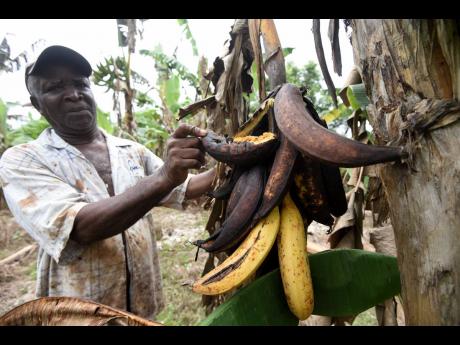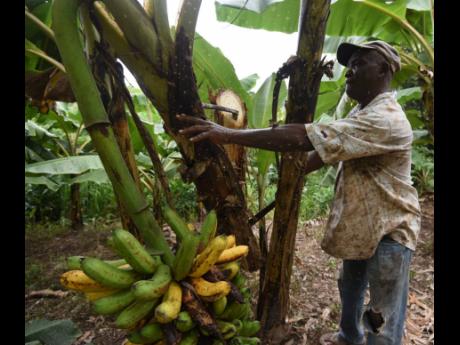Portland and St Mary farmers appeal for help
Banana and plantain crops ravaged by Tropical Storm Grace rotting in the fields
With more than 40 acres of fully grown banana and plantain crops ravaged by Tropical Storm Grace, two farmers in the neighbouring parishes of Portland and St Mary are now reeling from their losses.
The damage caused by the tropical storm was quite evident when The Gleaner visited both farmers and saw a large number of downed banana trees with fruit that was either badly damaged or ripened and on the verge of being spoilt. Additionally, plantain trees also suffered a similar fate.
Seventy-two-year old David Brown, who is a farmer in Golden Vale in east Portland, said that it was the hardest hit suffered by him in recent times and that this loss has basically crippled his livelihood. He added that he is not even sure how or when he might be able to recover from this devastation.
“I lost at least 10,000 tons of fully grown banana, which were either damaged or completely destroyed,” said Brown.
“I was encouraged to plant the FHIA banana, which was in demand for making banana chips, but that deal fell through,” Brown said. “I have more than 16 acres of FHIA banana, with 85 per cent of that amount fully matured. I have not sold any banana in three months, and now storm come and mash up di farm. The FHIA banana carry as much as 23 hands and weighs no less than 60 pounds.
DON’T HAVE A MARKET
“So I don’t have a market to sell, as the local people nah buy dem, because di people prefer our own local banana (Gros Michel, Lacatan, or Robusta). Di FHIA can be boiled and eaten, but when it ripe it is fresh (little or no taste). Higglers nuh really want it fi buy and sell. FHIA easier fi nuh really need fi spray, and it requires less fertiliser. RADA (Rural Agricultural Development Authority) naah gi we more than a bag a fertiliser, weh nuh mek no sense,” Brown argued.
According to Brown, who at one time employed more than 14 people, he along with other farmers were encouraged, more than 10 years ago, by the All Island Banana Growers Association (AIBGA) to invest in the planting of the FHIA banana, which would be bought from them to supply a banana chips factory that was being constructed in St Mary.
Brown said that the factory started and that he sold one yield of the crop, but that shortly after everything collapsed and the factory is left in limbo.
SERIOUS BLOW
Meanwhile, Devon Plunkett, a 62-year-old farmer from Albion Mountain in St Mary, is reporting that he lost 30 per cent of his banana crop (Robusta) during the passage of the tropical storm, which has dealt him a serious blow, especially during a time when his produce are sold to the local market only.
“I decided not to invest in the FHIA banana as I suspected that such a programme offered by the AIBGA was going to be short-lived, “said Plunkett.
“So I planted the Robusta, which is our locally produced banana, and it is edible when ripe, or boiled for breakfast, lunch, and dinner. Back then, it was also used for making by-product such as banana chips, banana bread, and banana pudding. So I never had a problem selling the Robusta, even though the export market no longer existed.
“The FHIA came along, which is a cross-breed of bananas and that was being sold primarily to chips factory and probably bakery. But the Robusta is always in high demand as this was good for export, through the banana producers export programme, where it was shipped to England in the 1970s, ‘80s, and parts of the ‘90s. I sell my Robusta to hotels, higglers, and just about everyone. But with what has happened now, I will definitely need some assistance to get back on my feet. I currently employ six people on my farm,” he added.


